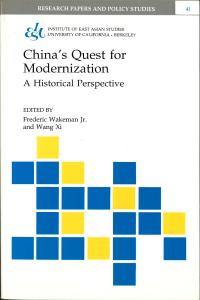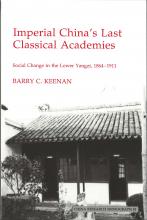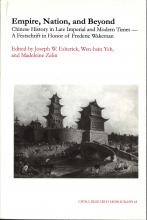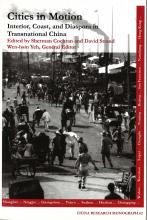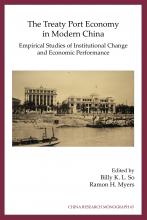China's Quest for Modernization
China's Quest for Modernization
Frederic Wakeman Jr., ed., Wang Xi, ed.
The seventeen essays collected here, written by Chinese and U.S. scholars, explore the reasons for China's historical failure to modernize and develop recommendations on the path China should follow in its current quest for modernization.
As a nonprofit academic press, we need your support to publish our books. Your gift can help us make more of our titles available as e-books. DONATE NOW
Title information
The seventeen essays collected here, written by Chinese and U.S. scholars, explore the reasons for China's historical failure to modernize and develop recommendations on the path China should follow in its current quest for modernization. The book opens with a general review and then moves into economic, political and social, cultural, foreign relations, population, comparative, and regional studies.
Contributors:
Marie-Claire Bergere is Professor of Chinese Civilization, Institut National des Langues et Civilisations Orientales, Institut de la Sorbonne Nouvelle.
Chen Jiang is Professor of History, Fudan University.
Ding Richu is Senior Researcher, Department of Modern Chinese Economic History, Shanghai Academy of Social Sciences.
Prasenjit Duara is Professor of History, University of Chicago.
Joshua A. Fogel is Professor of History and East Asian Languages and Cultural Studies, University of California, Santa Barbara.
William C. Kirby is Professor and Chair, Department of History, and Chair, Council on East Asian Studies, Harvard University.
James Q. Lee is Associate Professor in the Division of Humanities and Social Sciences, California Institute of Technology.
Luo Rongqu was at the time of the conference Professor of History and Director, Center for the Studies of the Process of World Modernization, Beijing University.
Pan Junxiang is Professor of History and Director, Shanghai Historical Museum.
Elizabeth J. Perry is Professor of Political Science, University of California, Berkeley.
Frederic Wakeman, Jr., is Walter and Elise Haas Professor of Asian Studies and Director, Institute of East Asian Studies, University of California, Berkeley.
Wang Xi is Professor of History and Economics, Fudan University, and President, Shanghai Institute of Business Administration.
Yang Liqiang is Professor of History and Chairman, Department of History, Fudan University.
Wen-hsin Yeh is Professor of History and Chair, Center for Chinese Studies, University of California, Berkeley.
Madeleine Zelin is Professor of History and East Asian Languages and Cultures and Director, East Asian Institute, Columbia University.
Zhang Guohui is Senior Researcher, Institute of Economics, Chinese Academy of Social Sciences.
Zhang Kaimin is Professor of Sociology and Director, Institute of Population and Development, Shanghai Academy of Social Science.
Zhang Zhongli is Professor of History and President, Shanghai Academy of Social Sciences.
Frederic Wakeman Jr., ed.
Frederic Wakeman Jr. (1937–2006) was Walter and Elise Haas Professor of Asian Studies and director of the Institute of East Asian Studies at the University of California, Berkeley.
B.A. Harvard University, Ph.D. University of California, Berkeley
Wang Xi, ed.
Wang Xi professor of history and economics, Fudan University.
China’s Quest for Modernization (RPPS 41)
Preface – vii
- 1. Approaches to the study of modern Chinese history: external versus internal causations– 1
Wang Xi - 2. Middle county radicalism: the May Fourth Movement in Hangzhou – 22
Wen-Hsin Yeh - 3. Evolution of modern Chinese society from the perspective of population changes, 1840-1949 – 50
Zhang Kaimin - 4. Historical demography in late imperial China: recent research results and implications
James Lee - 5. Modernization and the structure of the Chinese economy in the nineteenth and twentieth centuries – 87
Madeleine Zelin - 6. New approach to China's century of great transformation, 1840s-1940s – 129
Luo Rongqu - 7. Western learning and social transmutation in the late Qing – 150
Chen Jiang - 8. Dowager Empress Cixi and Toshmichi: a comparative study of modernization in China and Japan – 175
Ding Richu - 9. Political parties, party conflicts, and society in early Republican China – 191
Yang Liqiang - 10. Intercultural connections and Chinese development: external and internal spheres of modern China's foreign relations – 208
William C. Kirby - 11. Emergence and development of China's modern capitalist enterprises – 234
Zhang Guohui - 12. Popular protest and political progress in modern China – 250
Elizabeth J. Perry - 13. Power structure and modernization policies in twentieth-century China – 267
Marie-Claire Bergère – - 14. Influence of Shanghai's modernization on the economy of the Yangzi Valley – 279
Zhang Zhongli and Pan Junxiang – - 15. State and civil society in the history of Chinese modernity – 300
Prasenjit Duara - 16. Civil society in late imperial and modern China – 325
Frederic Wakeman, Jr. - 17. Issues in the evolution of modern China in East Asian comparative perspective – 352
Joshua A. Fogel. - Contributors – 382
|
JOURNAL REVIEWS |
|
"This collection of papers from a conference held at Fudan University in Shanghai in 1992 is praiseworthy for two reasons. The first is the simple fact that the conference was held less than three years after the Tiananmen crisis….The second praiseworthy feature is the excellent quality of some of the chapters. Despite the absence of a single thematic argument, several strong lines of discussion emerge from the book, and these are ably highlighted by Frederic Wakeman.... This well-produced book will be of use to scholars and advanced students alike." ~Peter Harris, Victoria University, New Zealand, in The China Journal 43, (January 2000): 217-219 (http://www.jstor.org/stable/2667576). |
|
"Based on a conference held in Shanghai in 1992, this collection of essays brings together an impressive group of Chinese and American scholars to reconsider some of the major issues in modem Chinese history....[T]he volume generally focuses on three broad themes: the interaction between China and the West, long-term secular trends in Chinese society, and state-society relations....Overall, this collection of essays is essential reading for all specialists and will provide much grist for graduate seminars and upper class history courses alike." ~Joseph Fewsmith, in The China Quarterly, no. 150 (September 1999): 735-736 (http://www.jstor.org/stable/655767) |
|
“For anyone who is interested in current discussions of China’s modernization, this volume is essential reading. It offers a wide variety of opinions to interpret China’s modernization and the policies of the current Chinese government.” ~Tze-Ki Hon, State University of New York, in Journal of Asian and African Studies 33, no. 4 (November 1998): 388-389. |

